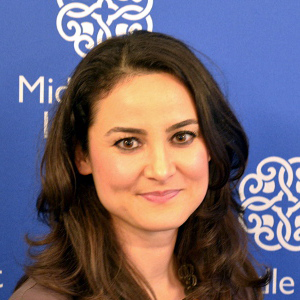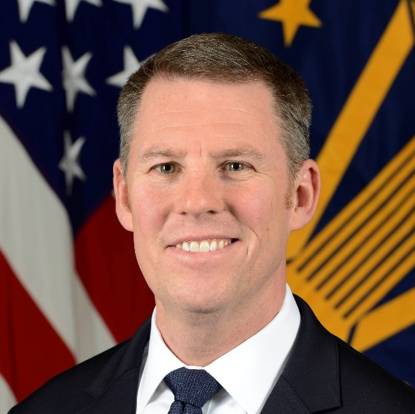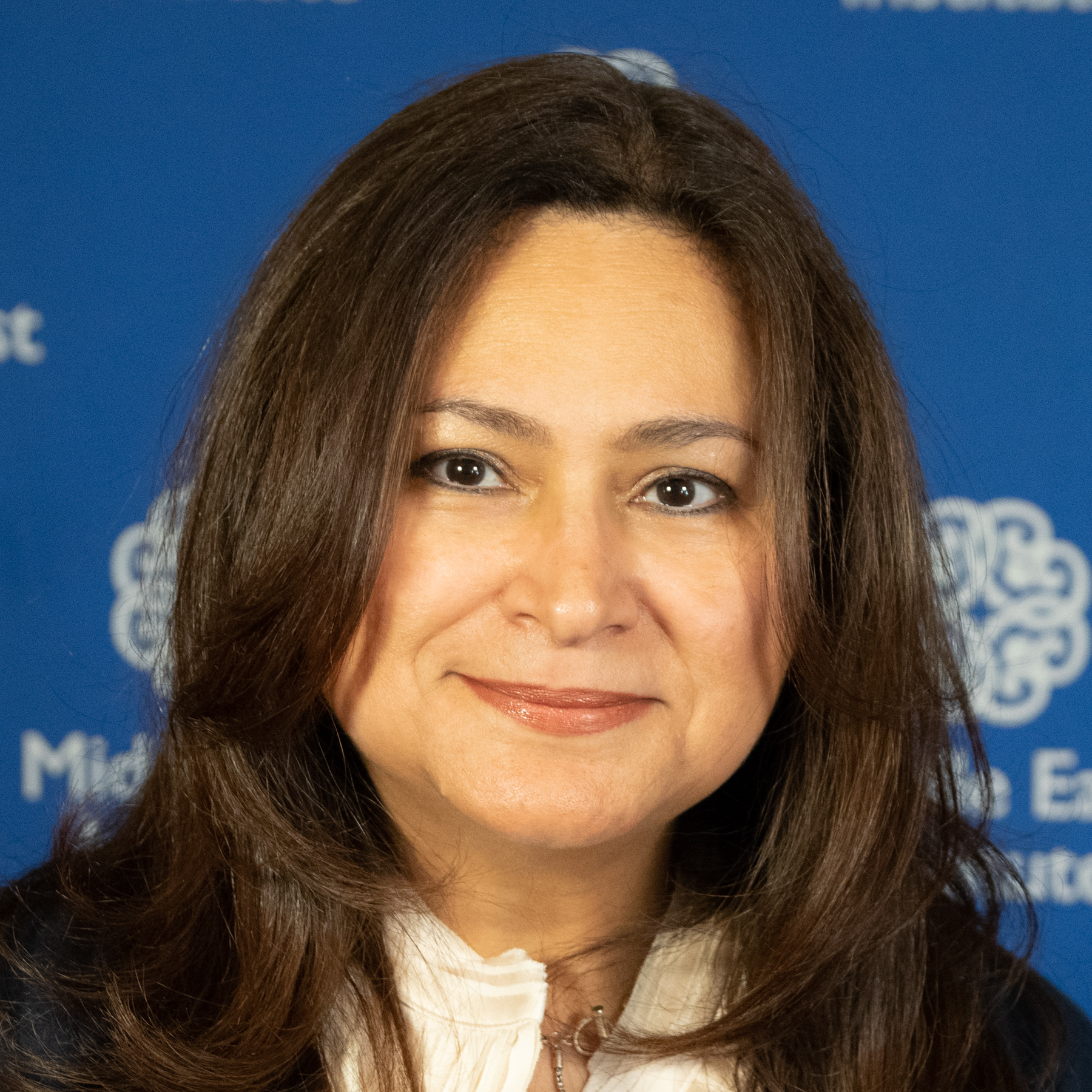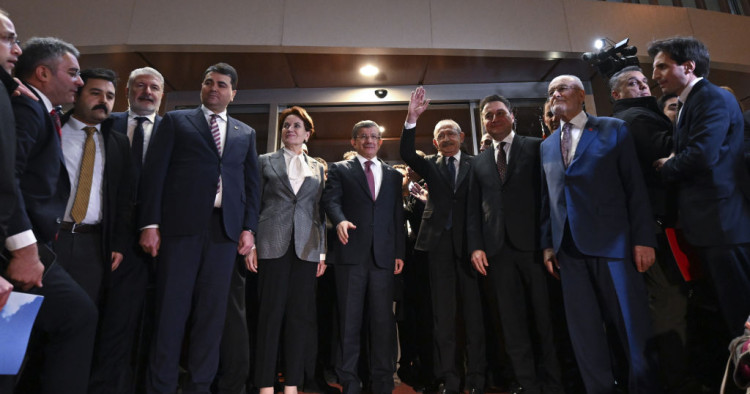Contents:
- Back together again? Turkish opposition reaches deal on joint presidential ticket
- Days after his extremist statement, Israeli finance minister wants to visit US
- Defense Secretary Austin in Middle East to deliver message of steadfast US support
- Gasoline price hikes further complicate life for Egyptians
Back together again? Turkish opposition reaches deal on joint presidential ticket
Gönül Tol
Director of Turkey Program and Senior Fellow, Black Sea Program

-
Despite saying she would pull out of the opposition bloc on March 3, Good Party leader Akşener reversed course after a deal was reached to run a joint ticket in the upcoming presidential elections.
-
Whether the pro-Kurdish Peoples’ Democratic Party will field its own candidate or back the opposition alliance ticket will be a key determinant of the alliance’s chances in the first-round presidential vote.
President Recep Tayyip Erdoğan must have breathed a sigh of relief after Meral Akşener, the leader of the Good Party (İyi Parti), one of the key members of the six-party opposition bloc, said on March 3 that she would pull out of the alliance due to a disagreement over the choice of joint candidate for the upcoming presidential elections. Akşener said she was opposed to the bloc’s insistence on the candidacy of Kemal Kılıçdaroğlu, the head of the main opposition Republican People’s Party (CHP), arguing he was not popular enough to beat Erdoğan. The disarray in the opposition bloc unnerved those opposed to the incumbent president’s autocratic rule at a time when popular opposition to the strongman is more robust than it’s ever been.
Cool heads prevailed over the weekend, and Akşener is set to reunite with the rest of the opposition alliance. The spat seems to have been resolved by an agreement to endorse popular CHP mayors from Ankara and Istanbul, Mansur Yavaş and Ekrem İmamoğlu, as Kılıçdaroğlu’s running mates. Although the bickering dealt a blow to the image the opposition alliance has sought to build as a united, competent actor that could solve the country’s pressing problems, the formula reached over the weekend significantly improves the opposition’s electoral prospects. Public opinion polls suggest Kılıçdaroğlu, Yavaş, and İmamoğlu are the most likely candidates to beat Erdoğan. The three of them running as a team will boost efforts to mobilize large segments of the country.
The country’s Kurds remain a key constituency. The pro-Kurdish Peoples’ Democratic Party (HDP), which is not formally part of the opposition bloc, has somewhere between 8% and 13% of the vote, according to polls. Before the Feb. 6 earthquake hit the country, the HDP announced it would field its own candidate, which would deal a blow to the opposition’s chances of beating Erdoğan in the first round of the presidential elections. Since the earthquake, the party has signaled that it might reverse course and support Kılıçdaroğlu’s candidacy. If the HDP takes that route, the opposition might win the elections in the first round, without having to go to a second-round run-off. After 20 years in power, Erdoğan has long been viewed as “invincible” both by his supporters and opponents. The earthquake that hit the country a month ago exposed the Turkey’s deep-rooted problems and compounded Erdoğan’s woes. A divided opposition was Erdoğan’s best bet to win the upcoming vote. As things stand today, that problem seems to have resolved itself.
Follow on Twitter: @gonultol
Days after his extremist statement, Israeli finance minister wants to visit US
Nimrod Goren
Senior Fellow for Israeli Affairs

-
Finance Minister Smotrich called on the State of Israel to wipe out the Palestinian village of Hawara, sparking harsh condemnation by the U.S. and the international community.
-
The U.S. administration should now decide whether to allow Smotrich’s visit to Washington, D.C., next week, which many in the American Jewish community and in Israel want to see canceled.
“I think the [Palestinian] village of Hawara needs to be wiped out. I think the State of Israel should do it,” said Israel’s far-right Minister of Finance Bezalel Smotrich, after Jewish settlers in the village carried out a pogrom there on Feb. 26, 2023. Smotrich, who has a track record of making racist, anti-Palestinian, and homophobic statements, sparked widespread international condemnation for his latest remarks. U.S. State Department Spokesperson Ned Price called the comments “irresponsible,” “repugnant,” and “disgusting”; European and Middle Eastern officials from multiple countries also voiced outrage.
The linkage between Israel’s democratic erosion and escalation in the Israeli-Palestinian conflict has been increasingly crystallizing. More and more, the international community indicates it is not willing to overlook it. The postponement of the Negev Forum summit, planned to take place later this month in Morocco, was an early such indication. The timing of Smotrich’s most recent extreme statement — which he has since attempted to somewhat walk back — provides an opportunity to assess how serious the American response will be.
Smotrich has been invited to speak in mid-March at a Washington, D.C., conference put on by the organization Israel Bonds, and so his ministry reportedly asked the U.S. Embassy in Israel and the State Department to grant him a diplomatic visa. But given Smotrich’s scandalous statement on March 1, and in light of the subsequent unprecedented spat that broke out between him and the U.S. ambassador to Israel, Tom Nides, the likelihood that the Israeli finance minister would be allowed to enter the United States was suddenly cast in doubt.
The pro-democracy camp in Israel has hoped — since the formulation of the new government — that the U.S. administration would announce its unwillingness to engage in any way with Israel’s far-right ministers and officials. Until now, the U.S. has practiced such a policy de facto; but this approach could become more formalized in light of the recent rhetoric and events coming out of Israel. In addition, a variety of Jewish-American organizations have called on Israel Bonds to cancel its invitation to Smotrich. Notably, 120 U.S. Jewish leaders signed a statement arguing Smotrich should not be given a platform in their community, and multiple Jewish organizations announced a demonstration in Washington to coincide with next week’s conference.
The U.S. has been progressively stepping up its criticism of the policies of Prime Minister Benjamin Netanyahu’s government, emphasizing the importance of safeguarding democracy for the future of the Israel-U.S. special relationship. But the rapid and dramatic developments in Israel require the Biden administration to respond more quickly and assertively than it may have initially planned. In such a context, a straightforward, uncontentious Smotrich visit to Washington, even if it does not include official meetings, would not seem to be the administration’s desired scenario.
Follow on Twitter: @GorenNimrod
Defense Secretary Austin in Middle East to deliver message of steadfast US support
Mick Mulroy
Non-Resident Senior Fellow and Co-Director of the Yemen Steering Initiative

-
Defense Secretary Austin’s multi-day trip to the Middle East aims to reassure local partners of Washington’s continued regional commitment.
-
Austin must deliver a message of steadfastness in the battle against ISIS, resoluteness in the face of the threat from Iran, as well as understanding of the region’s centrality to global security.
Although much of the U.S. national security establishment is focused on the war in Ukraine and the potential for one exploding in the Asia-Pacific, Defense Secretary Lloyd Austin’s multi-day (March 5-9) trip to Jordan, Egypt, and Israel aims to reassure local partners of Washington’s continued commitment to the Middle East region. The United States has the ability and interest to fully engage in every area of the world, including the Middle East. And Secretary Austin is the right person to deliver the message that the U.S. will be involved in the region for the foreseeable future and that we value the relationships there for the benefit of all. He was the former commanding general for U.S. Central Command; thus, he has extensive knowledge of the issues and personal relationships. They respect him and will listen to what he has to say.
And they need to. It appears that Iran used last year’s negotiations on possibly reviving the Joint Comprehensive Plan of Action (JCPOA) as a cover while it made further progress on its nuclear weapons ambitions. If the world wakes up tomorrow to Iran announcing that it has produced weapons-grade uranium, weaponized it, and achieved the ability to deliver it against targets in the region and beyond, global attention will shift immediately back to the Middle East.
It will also be important for the defense secretary to reinforce what the chairman of the Joint Chiefs of Staff, General Mark Milley, recently proclaimed, after visiting Syria: that the United States remains committed to the final defeat of ISIS. Through Austin, Washington needs to express to the government of Iraq and to the leadership of the Syrian Democratic Forces (SDF) that we greatly value their partnership in ending the so-called ISIS “caliphate” and to ensure it never returns. Our maintained presence in Iraq not only facilitates this mission, it also helps offset Iran’s mostly malign influence in the region.
The world is as interconnected as it’s ever been, and increasingly so. Therefore, while the Middle East is important to the United States in its own right, the region is also critical for its influence on all other areas of the world, especially in the energy sector. Washington needs to plan to stay permanently engaged, and our partners there need to know that.
Follow on Twitter: @MickMulroy
Gasoline price hikes further complicate life for Egyptians
Mirette F. Mabrouk
Senior Fellow and Founding Director of the Egypt program

-
Official assertions that a rise in gasoline prices wouldn’t impact transportation or produce costs are being met with doubt among Egyptian citizens.
-
There is no easy fix for the current situation; and if Egypt is to maintain stability, it simply cannot push its already beleaguered population as hard as the IMF seems to want.
Just when the majority of Egyptians thought they couldn’t pull their belts any tighter, the latest oil market fluctuations proved them wrong. Last Thursday, the Ministry of Petroleum and Mineral Resources announced on Facebook that the prices of diesel and gasoline would rise by 10%.
It was hardly a surprise. Brent crude prices have been rising, so Egypt, a net petroleum importer that subsidizes fuel costs for its citizens, has seen its subsidy rise to almost $66 billion despite careful hedging. That has raised the ire of the International Monetary Fund (IMF), which gave Egypt its fourth loan in six years last October. The IMF would like Egypt to lift the subsidies altogether, despite the fact that much of Europe has handled the energy crisis brought on by the Russian full-scale invasion of Ukraine in the same way, to the tune of almost $820 billion. Germany alone, a country of 83 million people with a per capita income of over $48,000, allocated $282 billion to cushion its citizens from the energy crisis. Admittedly, Germany hadn’t just taken out a loan with the IMF. But Egypt has a population of almost 106 million and a per capita income of around $4,600, less than a tenth of Germany’s.
Various Egyptian officials have hurried to explain that the rise in gasoline prices isn’t likely to impact the costs of the privately run microbuses that ferry the majority of the population, nor would fruits and vegetables become more expensive; but Egypt’s citizens aren’t buying it. The gasoline blends seeing cost spikes are used in factories, bakeries, and for most types of trucking, meaning fuel prices invariably affect the relative affordability of most goods, despite the government’s best efforts.
The IMF has indicated that it is taking a firmer line with its latest loan and is pressing Egypt on the three main conditions: freeing the exchange rate, closing the budget deficit, and liberalizing the investment market (roughly translated as having the state and military loosen their grip on the market). It’s the latest blow to an economy still reeling from the fallout from the COVID-19 pandemic, the war in Ukraine, and years of relying on hot capital to prop up its foreign exchange reserves. In line with the IMF’s first condition, the Central Bank released its hold on the currency market and shifted to a flexible exchange rate. The resulting devaluation has seen the Egyptian pound lose almost half its value against the dollar. Although the S&P purchasing managers’ index (PMI) survey saw cost inflation cooling slightly in February, it’s still at its highest point in five years, with manufacturing output expectations signaling a contraction for the 27th straight month. The downturns in demand and new orders weren’t as severe as at the beginning of the year; yet Egyptian businesses still cut employment at the fastest rate in nine months.
Egypt is currently scrambling to meet the last condition of the IMF loan — improving the investment climate. This has led to a flurry of potential sales of public companies, including, in a new development, ones held by the military and two of the state’s prized insurance companies. The Gulf countries have leaned in for a closer look. Egypt’s regional neighbors, which recognize that their security is intimately linked to it, have always offered a helping hand. However, changing global conditions have meant they will no longer be offering blank checks. They now expect not only a return on their investment but actual reforms. Saudi Finance Minister Mohammed al-Jadaan said as much during the World Economic Forum in Davos last January. That has some Egyptians nervous about the types of businesses the government will have to put up for sale, with various ports being a particular worry.
The global economic fallout is hardly the fault of the Egyptian government, and much of the rest of the world is struggling with similar issues. Egypt has been left particularly vulnerable, however, because of its policies over the last several decades. There is no easy fix, and if Egypt is to maintain stability it simply cannot push its already beleaguered population as hard as the IMF seems to want. The government understands this well, as evidenced by the recent boosts to social welfare, like higher minimum wages and pension increases. However, it will require creative thinking and more flexibility than has been sufficient to date. And it remains to be seen if the state is capable of relaxing its grip on the economy.
Follow on Twitter: @mmabrouk
Photo by Ercin Erturk/Anadolu Agency via Getty Images
The Middle East Institute (MEI) is an independent, non-partisan, non-for-profit, educational organization. It does not engage in advocacy and its scholars’ opinions are their own. MEI welcomes financial donations, but retains sole editorial control over its work and its publications reflect only the authors’ views. For a listing of MEI donors, please click here.













